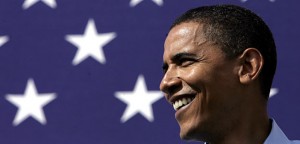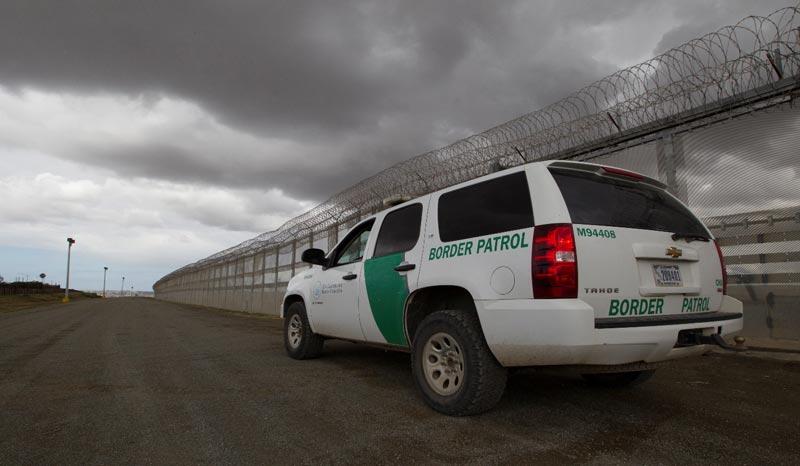(ThyBlackMan.com) I gave a speech at a church in upstate New York shortly after Barack Obama was elected President of the United States. During the service, the choir director took the liberty of changing the words from the song “We shall overcome,” to “We HAVE overcome.” I also remember hearing a woman outside the speech proudly announce that she had just bought a new picture of President Barack Obama. The woman said she was going to put the image right next to her pictures of Martin Luther King and Jesus. Apparently, Obama’s election was a second-coming of Juneteenth for those who seemed to feel that a black president could do no wrong.
But there is a more fundamental question in all of this: Should President Obama’s image be placed next to those who’ve fought for Civil Rights in the  past? In recent survey by YourBlackWorld.com, 62.9% of the 734 respondents said they do not consider President Barack Obama to be a true Civil Rights Leader. Another 28.5% said that they do consider President Obama to be a Civil Rights leader. The rest claim they aren’t sure.
past? In recent survey by YourBlackWorld.com, 62.9% of the 734 respondents said they do not consider President Barack Obama to be a true Civil Rights Leader. Another 28.5% said that they do consider President Obama to be a Civil Rights leader. The rest claim they aren’t sure.
According to reference.com, Civil Rights are defined as “rights to personal liberty established by the 13th and 14th Amendments to the U.S. constitution and certain Congressional acts, especially as applied to an individual or a minority group.”
The Your Black World survey results are in some degree of contrast to a recent ranking of the top Civil Rights leaders of the 21st century written by Bakari Kitwana and Hakim Hasan. On their list, President Obama was ranked number one, followed by Rev. Al Sharpton and a host of others. I respect the opinions of the authors, but also felt that varying points of view should be considered on this important issue. For the sake of full disclosure, I was also ranked on the list, but I provide my opinions independent of where I was ranked in the article.
The most fundamental question is whether or not we can or should consider President Obama to be a Civil Rights leader. For many African Americans, a Civil Rights leader would be an individual who has fought to secure rights and liberties for African American people. By making it clear that he must lead all Americans and not just the black community, President Obama does not belong at the top of the list of those who’ve sacrificed for the advancement of black people. Therefore, the woman who wanted to put Obama’s picture next to Martin Luther King and Jesus would be just as wrong to put their pictures next to George W. Bush or Bill Clinton. In other words, Barack Obama is no Martin Luther King and if King were alive today, he’d work with Obama but find himself frustrated by the president’s resistance to fighting the racial inequality that continues to exist to this day.
But fighting for African American issues is not the only way to be a Civil Rights leader. There are quite a few Americans who fight for the rights of animals, the poor, the gay community, etc. In that regard, one might consider President Obama to be a Civil Rights leader for all of America, not just black America. The problem, however, is that the President of the United States runs the executive branch of the government. The goal of the executive branch (as we learned in 8th grade Civics class) is to execute the law, not change or interpret it. Although we often see presidents working with Congress to change the law, the fact remains that the President doesn’t quite have the latitude to behave as the ambitious grass roots leader who pushes to change the way America does business.
At the end of the day, the fact is that if we are to put President Barack Obama at the top of any list of Civil Rights leaders, we would have to do the same for Bill Clinton, George W. Bush or John F. Kennedy. While protecting Civil Rights might be the domain of our political leaders, they are not always first in line when it comes to providing the leadership necessary for that change to occur. Instead, the most radical change starts with the people and our political leaders are ultimately urged to follow-suit. That’s what Civil Rights leadership is all about.
Staff Writer; Dr. Boyce Watkins
Dr. Boyce Watkins is the founder of the Your Black World Coalition. For more information, please visit http://BoyceWatkins.com.




















Oh yeah, you may have heard Dr. King say something about the color of their skin and not the content of their character. Let’s examine Barack Obama for his mettle and his historic accomplishment. Let’s bring Dr. King’s dream to fruition, by being the first segment of American society, to not be caught up in how Black he acts.
The question, itself, is absolutely ridiculous! Of course he’s not a true civil rights leader. For the context of this conversation, as it pertains to Black Americans, a civil rights leader is an worthless individual, who appears on camera, and patronizes Black people so much, that they decide to send him enough money in the mail, to where he does not have to be gainfully employed. Barack Obama, upon becoming elected President, jettisoned himself way above that kind of snake-oil peddling.
Now if an individual decides that his pic belongs on the wall beside Dr. King’s, then that individual makes sense to me. Anyone who feels like this is blaspheming, is severly disrespecting the real grass-roots Black people who risked life, and limb during the movement, and got none of the publicity that King got for it. A photo of King represents the movement, not a man who took his pants down and cheated on his wife, like every other man. Okay? It’s about the cause.
That is what Barack Obama is an icon for. His name, his skin color, his face represents the dues paid by a lot of people over a period of nearly 150 years after the Emancipation Proclamation. The man is the leader of the free world, not some loud-mouthed preacher trying to get on. And therein lies the problem isn’t it? Barack handled his business, without waiting on ANY of those fake archetype 60’s civil rights leader throwbacks to give him their seal of approval, and he still aint.
They got mad about the Jeremiah Wright thing. Have you gone to YouTube and seen that animated clown preach? Are you freakin’ serious? Jesse wanted to cut his balls off. Sharpton cried for chair-time with him. But why would he? For what reason? What reason would any thinking person have for sitting down with Al Sharpton? A preacher-with-a-perm? Are you freakin’ serious?!?!?!? Barack did not go “through them” to get to the Oval Office, which proves my point…..they….are….useless.
The brother is up there trying to run an entire nation, and we have Black people having a fit, ’cause he aint slang no government cheese at us yet. No Barack is not a true civil rights leader, he’s the President of the United States. He actually means something.
Hit me.
IT IS A DISGRACE TO MENTIONED HIM IN THE CLASS OF DR. KING…. DR. KING IS A ” GIANT ” !!!!!!….
President Obama NEVER said he was a “civil rights leader”. He has said he will lead the American people. And as President he must protect our civil rights.
Think about this… We (Black folks) assumed that as a Black man he would do more for us. But in hindsight, I do not recall him making a pledge, a campaign promise or a statement saying he would be a civil rights leader. I do see him working tirelessly and doing his best to keep the campaign promises he did in fact make. My question is, where are the civil rights leaders of today?
No, Barack Obama is not a Civil Rights Leader. I have worked with Obama for over 20 years as a Chicago Community Organizer and throughout his political career and Obama never considered himself anything but a serious analyst of people and issues of the disenfranchised, and then as an organizer of those people to turn their pain into power, but never did he ever speak of himself to be considered a Civil Rights leader. We should spend more time educating our people on who actually ARE trained and led in the legacy of established civil rights leaders and those respective roles, but Barack Obama never sought to be considered a next generation civil rights leader.
I can see why folks take exception with Dr.Watkins. As usual, he makes broad and sweeping generalizations that often obscure his valid points. If the point of the article was to raise the issue of whether or not Obama has fought diligently enough for civil rights specifically in terms of black americans, then he could have done so without some of the unsubstantiated and broad strokes that loops in too many other things.
I would have drawn a more defined comparison between what ‘non-political, non-elected officials’ can do in terms of civil rights vs what our elected officials can do. And what exactly was offered as proof or evidence of why Obama shouldn’t be considered a civil rights leader? Merely pointing out that he typically reminds us that he is the President of all Americans, not only Black Americans? I think you would need to cite more specific examples. Maybe some policy decisions or vetoes made or that should have been made. In the end, the whole term “civil rights leader” should be obsolete. It has outlived its effectiveness in describing specific activities and is used with a much broader stroke now—even as Dr. Watkins pointed out. I believe we should ask the question about whether or not a person is an effective activist or agent of change for black Americans and black causes (which still will include its impact on the rest of the country).
Further, to make the leap that the woman who wanted to put Obama’s pic along side MLK & Jesus was evidence of this mass hysteria that black folks see him as the new messiah, is much too careless. This is the same argument that the white media uses to discredit Obama merely on race. My take on the woman was simply her pride in what she perceived as a honorable recognition of our 1st black president. No more, no less. Now it’s true that some folks went overboard during and after the elections but that was just the overwhelming excitement of history being made.
In the end, give the black populace credit that we know Obama can only do what these white folks in power will let him do. Meanwhile, we are just happy that he is such a thorn in their side.
Dr. Watkins,
As usual, you have written a very sensible article, one that I wish would be required reading for those African Americans who think President Obama is Their President. It is time that the African American community confront its own shortcomings: its lack of a viable culture that can guide their children and strengthen their communities; their acceptance of hip-hop without any discussion of the damage is has done and is doing to our youth; the clear social and cultural division of African Americans along economic lines and what effects this is having not only on poor children but middle-income ones as well. We continue to rant about historical injustices but do nothing to confront the present decay caused by those injustices. As a community, African Americans are in extremely bad shape and absolutely refuse to discuss it. Please keep reminding them of their responsibility to their children and to future generations.
With sincere appreciation,
Elinor Bowles